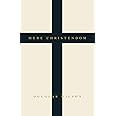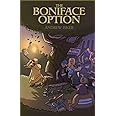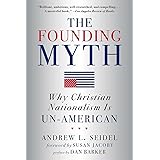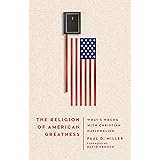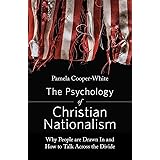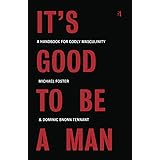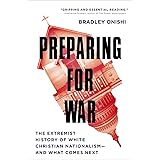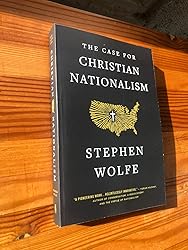
Enjoy fast, free delivery, exclusive deals, and award-winning movies & TV shows with Prime
Try Prime
and start saving today with fast, free delivery
Amazon Prime includes:
Fast, FREE Delivery is available to Prime members. To join, select "Try Amazon Prime and start saving today with Fast, FREE Delivery" below the Add to Cart button.
Amazon Prime members enjoy:- Cardmembers earn 5% Back at Amazon.com with a Prime Credit Card.
- Unlimited Free Two-Day Delivery
- Streaming of thousands of movies and TV shows with limited ads on Prime Video.
- A Kindle book to borrow for free each month - with no due dates
- Listen to over 2 million songs and hundreds of playlists
- Unlimited photo storage with anywhere access
Important: Your credit card will NOT be charged when you start your free trial or if you cancel during the trial period. If you're happy with Amazon Prime, do nothing. At the end of the free trial, your membership will automatically upgrade to a monthly membership.

Download the free Kindle app and start reading Kindle books instantly on your smartphone, tablet, or computer - no Kindle device required.
Read instantly on your browser with Kindle for Web.
Using your mobile phone camera - scan the code below and download the Kindle app.

OK
Image Unavailable
Color:
-
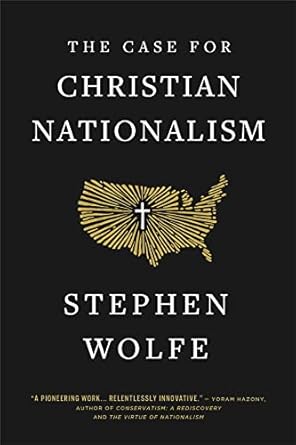
-
-
- To view this video download Flash Player
-

-

-

-

-

-

-
 2 VIDEOS
2 VIDEOS -

 Audible sample Sample
Audible sample Sample 


The Case for Christian Nationalism Paperback – November 1, 2022
Purchase options and add-ons
Additional Details


Few “experts” answering this question actually know what nationalism is--and even fewer know what could make it Christian. In The Case for Christian Nationalism, Stephen Wolfe offers a tour-de-force argument for the good of Christian nationalism, taken from Scripture and Christian thinkers ancient, medieval, and modern. Christian nationalism is not only the necessary alternative to secularism, it is the form of government we must pursue if we want to love our neighbors and our country.
Wolfe shows that the world’s post-war consensus has successfully routed the United States towards a gynocratic Global American Empire (GAE). Rather than the religious right’s golden calf, Christian nationalism is the idea that people in the same place and culture should live together and seek one another’s good. The grace of the gospel does not eliminate our geography, our people, and our neighbors. Instead, it restores us to pursue local needs and local leadership freely and without apology.
If you want to be able to answer the political debate raging today, you must understand the arguments in The Case for Christian Nationalism.
- Print length508 pages
- LanguageEnglish
- PublisherCanon Press
- Publication dateNovember 1, 2022
- Dimensions6 x 1.27 x 9 inches
- ISBN-101957905336
- ISBN-13978-1957905334
The Amazon Book Review
Book recommendations, author interviews, editors' picks, and more. Read it now.
Frequently bought together
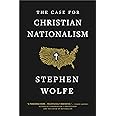
Similar items that may deliver to you quickly
 Christian nationalism is a totality of national action, consisting of civil laws and social customs, conducted by a Christian nation as a Christian nation, in order to procure for itself both earthly and heavenly good in Christ.Highlighted by 736 Kindle readers
Christian nationalism is a totality of national action, consisting of civil laws and social customs, conducted by a Christian nation as a Christian nation, in order to procure for itself both earthly and heavenly good in Christ.Highlighted by 736 Kindle readers Christians today live in and fully embrace the conditions of deicide. We have not simply tied our own hands; we’ve handed over, without much fuss, the divine powers ordained for our good. The people of God have become accustomed to a life without them, even learning to love abuse from God-granted authorities that he ordained for their good.Highlighted by 276 Kindle readers
Christians today live in and fully embrace the conditions of deicide. We have not simply tied our own hands; we’ve handed over, without much fuss, the divine powers ordained for our good. The people of God have become accustomed to a life without them, even learning to love abuse from God-granted authorities that he ordained for their good.Highlighted by 276 Kindle readers Viewed as a whole, the Christian nation acts for itself by a three-step process: (1) It achieves a national will for itself; (2) that will is mediated through authorities that the people institute; and (3) the people act according to the dictates of that mediation.Highlighted by 268 Kindle readers
Viewed as a whole, the Christian nation acts for itself by a three-step process: (1) It achieves a national will for itself; (2) that will is mediated through authorities that the people institute; and (3) the people act according to the dictates of that mediation.Highlighted by 268 Kindle readers
From the Publisher





|

|

|

|

|
|
|---|---|---|---|---|---|
| Christian nationalism, the only way forward? | A history of Christian civil resistance | Fight for masculinity. | A reformation game plan. | A classic defense of civil resistance | |
| Customer Reviews |
4.3 out of 5 stars
367
|
4.8 out of 5 stars
302
|
4.7 out of 5 stars
777
|
4.7 out of 5 stars
336
|
4.8 out of 5 stars
123
|
| Price | $22.49$22.49 | $12.49$12.49 | $16.69$16.69 | — | $9.96$9.96 |
| Build your toolkit for the reformation | ✓ | ✓ | ✓ | ✓ | ✓ |
Editorial Reviews
Review
The Case For Christian Nationalism is a masterpiece. The path ahead of us as Christians is clear and I pray that once our brothers and sisters read this book they will realize that Christian Nationalism is that path. This is who we are, who we were, and who we always will be. Stephen makes the case clear as day. This book is must-read for pastors, political leaders, and everyone in between.” --Andrew Torba, bestselling author of Christian Nationalism: A Biblical Guide for Taking Dominion
“Wolfe’s book is precisely what we need in this moment. He is an accomplished scholar and provides exactly the clear, logical, precise arguments that Christian nationalists need to defend Christian engagement in politics that is anything other than the typical automatic surrender to secularism. If you want to bolster your understanding of Christian political engagement and if you want to be heavily armed with every possible argument those who demand your surrender will muster, you absolutely must read this book.” --Andrew Isker, bestselling Author of Christian Nationalism: A Biblical Guide for Taking Dominion
"The Case for Christian Nationalism is a carefully reasoned case for an approach that our nation had at our founding and should never have abandoned. We are today living in the wreckage of that abandonment. Stephen Wolfe is to be thanked for having the courage and learning to show us our way back.” ~Douglas Wilson, pastor of Christ Church and Christianity Today award-winning author of Evangellyfish
“Wolfe’s book addresses--with unmatched depth--a subject of growing interest in both evangelical circles and wider academic and political discourse.” -Nate Fischer, entrepreneur and cofounder of American Reformer and New Founding
"Refreshing to read a new, careful text that addresses questions of classical political philosophy in light of these distinctly Christian distinctions about the nature of man.” -Clifford Humphrey, Director of Religious Coalitions at the Edmund Burke Foundation
“Clearly argued and forceful in its conclusions, The Case for Christian Nationalism sets the standard for today’s debates. It’s a marvelous book full of things to ponder, agree with, and argue about.” ~R.R. Reno, editor of First Things
"Wolfe has stepped into the arena with a remarkable work of Christian political theory well worth reading.... Wolfe's book signals that a growing movement of Protestant resourcement has achieved a critical mass; he has thrown a glove down and others are sure to join him." -The American Conservative
"Wolfe gives Christians a coherent intellectual foundation that can withstand the gale force winds of our age. But political theory cannot enact itself. Christians must have the courage, manliness, fortitude, and strength to lay the groundwork in the decades ahead for what will assuredly be a multi-generational effort." -The Federalist
About the Author
Product details
- Publisher : Canon Press (November 1, 2022)
- Language : English
- Paperback : 508 pages
- ISBN-10 : 1957905336
- ISBN-13 : 978-1957905334
- Item Weight : 1.56 pounds
- Dimensions : 6 x 1.27 x 9 inches
- Best Sellers Rank: #46,156 in Books (See Top 100 in Books)
- #3 in Religious Fundamentalism (Books)
- #17 in Nationalism (Books)
- #158 in Political Conservatism & Liberalism
- Customer Reviews:
Videos
Videos for this product

3:06
Click to play video

What is Christian Nationalism?
Canon Press
Videos for this product

1:30
Click to play video

If we want to restore Christendom, we have to fight for it.
Canon Press
About the author

Discover more of the author’s books, see similar authors, read author blogs and more
Customer reviews
Customer Reviews, including Product Star Ratings help customers to learn more about the product and decide whether it is the right product for them.
To calculate the overall star rating and percentage breakdown by star, we don’t use a simple average. Instead, our system considers things like how recent a review is and if the reviewer bought the item on Amazon. It also analyzed reviews to verify trustworthiness.
Learn more how customers reviews work on AmazonReviews with images
-
Top reviews
Top reviews from the United States
There was a problem filtering reviews right now. Please try again later.
I’m waiting for someone to engage with the widely accepted Christian and conservative premises and provide a compelling counterargument. Until then, Wolfe has done a compelling job stating the case for Christian parents working to make sure their kids grow up in a country that’s MORE Christian than the one they grew up in.
His premises are straightforward—and so is the historical and theological support he brings for each one. (That’s the reason this book needs to be 400+ pages. It’s a CASE, not a tweetstorm.)
Here’s a 30,000 foot summary of those tricky premises no one wants to engage with:
1. Societal organization existed before the Fall, so it’s natural and good.
2. The basis of society is that every person loves the people close to them, and that’s natural and good, too.
3. Therefore, a society composed of people working for each other’s earthly and heavenly good is also natural and good.
That’s it. That’s Christian nationalism.
All orthodox Christians can agree with those premises, and it doesn’t entail racism, hatred, or jumping barriers at the Capitol.
Of course there’s much more to this book, and Wolfe deals with lots more practical questions, including: Can cultural Christianity be a force for good? What can laws do, and what can’t laws do? What would a leader in such a society look like? How does liberty of conscience function in such a society? Is rebellion allowable? Did the founding fathers think about America in this way?
And what’s also fun about this book is that Wolfe states an optimistic future, rejecting things that are tearing our nation apart and laying the groundwork for important conversations in the future. Here’s to decades more discussions inspired by “The Case for Christian Nationalism”!
Reviewed in the United States on November 2, 2022
I’m waiting for someone to engage with the widely accepted Christian and conservative premises and provide a compelling counterargument. Until then, Wolfe has done a compelling job stating the case for Christian parents working to make sure their kids grow up in a country that’s MORE Christian than the one they grew up in.
His premises are straightforward—and so is the historical and theological support he brings for each one. (That’s the reason this book needs to be 400+ pages. It’s a CASE, not a tweetstorm.)
Here’s a 30,000 foot summary of those tricky premises no one wants to engage with:
1. Societal organization existed before the Fall, so it’s natural and good.
2. The basis of society is that every person loves the people close to them, and that’s natural and good, too.
3. Therefore, a society composed of people working for each other’s earthly and heavenly good is also natural and good.
That’s it. That’s Christian nationalism.
All orthodox Christians can agree with those premises, and it doesn’t entail racism, hatred, or jumping barriers at the Capitol.
Of course there’s much more to this book, and Wolfe deals with lots more practical questions, including: Can cultural Christianity be a force for good? What can laws do, and what can’t laws do? What would a leader in such a society look like? How does liberty of conscience function in such a society? Is rebellion allowable? Did the founding fathers think about America in this way?
And what’s also fun about this book is that Wolfe states an optimistic future, rejecting things that are tearing our nation apart and laying the groundwork for important conversations in the future. Here’s to decades more discussions inspired by “The Case for Christian Nationalism”!


Wolfe begins by noting that “the absence of God in public life is now normal”, he invokes Rousseau to claim that today’s Christians glory in their suffering, our religion is used as a “coping device for inaction”, and that our problem today is a “lack of will” for political change.
Wolfe then wants to advance a political theory that will “enliven…the hearts of Christians” so that they then are inspired to take action for their good. Wolfe attempts to frame this as a positive answer to what he calls the “secularist civil religion” of our day, but really it’s offered as a negative dialectic as much as we might call it anything positive because his chief concern is to answer the problematization in play. In this way, Wolfe is entirely postmodern in his approach. Wolfe isn’t presenting a normative political theory that attempts to explain the world, he’s offering an alternative critical theory meant to change it. The change he seeks is right in line with Marx’s Eleventh Thesis on Feuerbach, “Philosophers have hitherto only interpreted the world in various ways; the point is to change it.”
We should consider that Augustine wasn’t the only one to frame man’s condition in terms of creation, fall, and redemption. Marx did also and the key difference is the demythologizing Marx offered through gutting Hegel’s work of any Christian content. Of course, Wolfe would like to return to a sort of baptized critical theory in his establishment of Christian Nationalism but he is working in the same vein as Adorno, Horkheimer, Marcuse, and the general dictates of political science today as far as theory is concerned. Wolfe would answer that he’s not doing sociology in his work but I don’t believe him. Political science is just as much social science as sociology is and both are thoroughly infected with critical theory throughout the disciplines.
So far, most critical reviews of Wolfe’s work of any substance have focused on how Wolfe misinterprets the Reformed tradition as if the book in the main is about Reformed theology. Critics are certainly right to knock Wolfe here as Mattson has brilliantly done, but I would suggest that Wolfe’s methodology is largely unconcerned with the details of the various Reformed traditions in play. First of all, Wolfe pretends there is a single Reformed tradition to speak of when the fact of the matter is that there are multiple streams in play with both the magisterial Reformation and what we might call post-Reformation Reformed scholasticism. There is actually a great diversity in thought the deeper you go into the various historical sources, but you will never catch Wolfe talking about the Reformed traditions in play as any sort of conversation partner with the actual traditions themselves (except, for example, to dismiss the likes of Augustine or Luther as he moves toward Aquinas). Wolfe merely assumes he’s speaking for the Reformed tradition and as such his presentation is entirely begging the question in the first place.
In fact, Wolfe even extends this to a larger unitary Christian tradition also. Wolfe constantly acts like there is only one Christian tradition. This is perhaps best seen when Wolfe pretends that “the Christian tradition” has historically seen love in three ways (benevolence, beneficence, and complacence). In fact, Christianity has seen love in massively different ways that can’t merely be framed through the work of Aquinas or Edwards as Wolfe representatively cites them for the whole of Christian tradition, both rather late witnesses considering the extensive commentary over the last two thousand years on the subject of love. He’s just wrong here and misrepresents the diverse nature of Christianity throughout the centuries on a fundamental question like the definition of love.
We don’t even see the nuance of Turretin distinguishing between this and that in Wolfe’s Epilogue, for example. No, the politeness of an academic theory is left behind for what’s ultimately tweetable in the last section of his book and operative for political change. Wolfe presents post-Reformation Reformed scholastics precisely because he is appealing to a Reformed audience conditioned by the likes of the Davenant Institute and Richard Muller’s Post-Reformation Reformed Dogmatics to see a certain type of historical theology as acceptable sources. In other words, Wolfe needs Aquinas to ground his prelapsarian approach in something valuable to his readers. What better than a selective read of Reformed scholastics that purportedly borrowed from Aquinas and Aristotle? Wolfe’s sources are, true to form, very selective, postmodern in their appropriation since it is anachronistic to say they would endorse a Christian nationalism, and he also ignores other important voices in the various traditions that could be employed to speak against his theory.
Further, Wolfe also forgets that nationalism as he theorizes was not in play per se in the 17th-18th centuries but rather the discovery of a New World and colonialism along with the likes of Westphalia. The Massachusetts Bay Colony was a colony, not a new nation, so grounding religious tolerance in the descendants of Cotton Mather don’t ring quite as true as he would like. Geneva was a city-state of sorts, not a nation. So, whatever Wolfe would like to posit toward nationalism in its historical context is likely operative in arguing for other alternatives seen in things like the foundation of the Dutch Republic establishing the modern nation-state, a new international order contra the previous Holy Roman Empire, and the rise of the British Empire, itself a multi-ethnic conglomerate.
Notice that Wolfe has an entire chapter devoted to revolution and a second one on freedom of conscience. The critical nature of critical theory is to liberate the oppressed and the yearning toward freedom is the one thing that critical theory seeks to establish. While Wolfe’s view is premised on order (following, incidentally, Hegel), the truth is he seeks freedom for a nation to do good in line with the dictates of the gospel. So, Wolfe’s viewpoint properly understood also aligns with critical theory. The question is not whether Wolfe is some kind of Marxist parading as a Nationalist but rather the methodology he employs and the goal of his working theory.
Wolfe also demonstrates other tendencies common to contemporary political thought that go uncited and unnoticed unless one has read Marcuse and other critical theorists. Watch in his chapter on revolution how he describes today’s society in fine Marcusean fashion:
“The powers of our modern world—the ones that undermined true religion in the West—are more implicit and psychological; they operate in the normalization of secularism. Its normalization is evident in the fact that “normal” people affirm it, live it, and expect it. Our secularized minds are shaped for it, and thus theological traditions that are clearly opposed to secularism had to be recast as its greatest adherents (e.g., modern two-kingdoms theology).” (341)
Further, Wolfe then goes on to say that the solution to “normalized modern liberalism” is “deconstruction” because the current “regime’s chief objective is suppressing an activist Christian religion that seeks Christian normalization and anti-secularism” the very thing Wolfe would like to see instituted as Christian Nationalism.
The point here is not to call Wolfe a Cultural Marxist but only to identify that the methodology of his book certainly follows the dictates of critical theory and his project can be seen in that light given how he proceeds throughout his book to establish a case for what he calls Christian Nationalism. While Wolfe draws on selective support from historical theology, remember that his work is really a political theory and ought to be evaluated as such. The irony, of course, in being yet another instance of critical theory at work is that it remains a racist accounting meant to support a nationalism that isn’t Christian and that remains attached to the obscure political movement of Kinism. Other more sinister tones are offered in light of struggle, the will of a people, and the constant focus on order in the book that should also give one pause the same way films like Triumph of the Will cause us to shudder today. The real historical tradition Wolfe relies on here is much more a matter of nineteenth century romanticism and the stuff of Wagnerian operas. Thinking Reformed theology is the primary driver of his viewpoint is a royal mistake as he quotes figures like Ernest Renan in addition to Aquinas and whoever else provides cover for the inherent racism he projects through terms like ethnicity.
Top reviews from other countries
To put it in biblical language, if you are a Christian looking for solid robust reformed politics thought, Wolfe is a broken reed, do not lean on him lest his system snap and stab you through the hand. Do you want something substantial, something with real answers to our current political situation? Go read Bahnsen, you’ll thank me later, and in advance I’ll say, you are most indubitably welcome!



